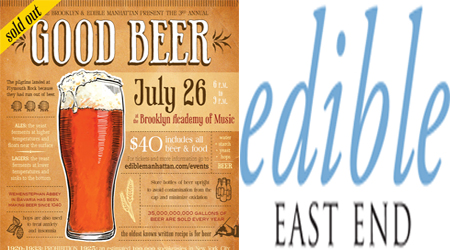
GOOD BEER AND Edible Hamptons, Edible Brooklyn… Publisher Stephen Munshin speaks to us at a Good Beer event in Brooklyn, at Broolkly Academy of Music. It was great. Look in your backyard. There’s a burgeoning wine country, chefs carving out a Long Island cuisine, and farmers cooking artisanal potato chips. The East End is in the midst of a food revolution, and we hope that Edible East End can be your guide. http://www.edibleeastend.com
By celebrating the harvest of the Hamptons and North Fork, season by season, we imagine Edible becoming a gravitational center for a whole universe of food festivals, culinary traditions, and new food businesses.
We share in a long history of farmers, fishers, poets, and happy eaters moved by freshly dug steamers, ears of sweet corn still warm from the field, Long Island duck, and the East End’s blissful culinary experience. (This experience has appealed to us since we were kids, and still does today: Stephen is a veteran of the restaurant biz and surfcaster, and Brian is a food writer and home gardener.) Of course, we’re not reinventing the wheel. Every potato barn and flounder fyke is evidence that an edible awareness was once more second nature than it is today. Where else can the simple act of raking a clam or digging a potato tap into hundreds of years of history?
But this history is also vanishing as baymen sell their dories, as farms are paved, and as old cooks pass away without passing on their recipes. Not exactly the ghost at the feast, local fare still doesn’t enjoy the prominent place at our tables it deserves.
We don’t harbor any illusions that things will return to some Golden Age that never existed. Yes, Long Island potato farmers fed the Allied troops in World War II, and until the early 1980s, the Peconic Bay Scallop enjoyed an international reputation. Further back, an appreciation of local cuisine was more necessity than choice.
The East End may never again be a breadbasket for the nation or even the Northeast, but there’s no doubt it could be a breadbasket for itself.
At a time when the global vending machine dazzles us with food trucked several thousand miles from the farm to our table, the best choice might be turning our attention inward. Eating local means fresher and tastier fare, embracing the beauty of our landscape, and building a constellation of relationships with farmers, fishers, winemakers, chefs, bakers, cheesemakers, beekeepers, and our neighbors. (Not to mention that eating local prevents sprawl, saves oil, and even pleases the Department of Homeland Security, since less food shipping makes the nation less vulnerable to spikes in the price of oil, transportation disruptions or large-scale food contamination.)
There’s no reason to eat from the back of a trailer when you can get it in your own backyard. We choose to eat local because it’s delicious, gratifying, and easier than you think. And we’re looking for allies, since the East End’s food heritage will only thrive because all of us want it to. That might sound idealistic. But it’s also true.

